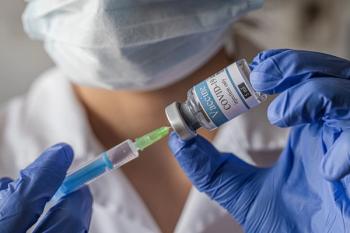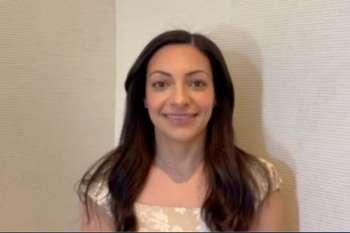
IKA Keratoconus Symposium 2023: Live patient Q&A, in-person white paper development, and more

Andrew Morgenstern, OD, FAAO, FNAP, sits down to discuss the inaugural IKA Keratoconus Symposium in Scottsdale, Arizona, in April 2023.
Video transcript
Kaiser:
Hi everyone. I'm Emily Kaiser with Optometry Times and I'm sitting down with Dr. Andrew Morgenstern who was one of the cochairs of the IKA Keratoconus Symposium in Scottsdale, Arizona, in April of 2023. Welcome, Dr. Morgenstern. Thank you for taking the time to talk to us.
Morgenstern:
Thanks so much for having me. This is really exciting. We're really looking forward to this symposium in Scottsdale.
Kaiser:
So why should practitioners be excited about this inaugural meeting of the International Keratoconus Academy?
Morgenstern:
Well, I think everybody should be excited about it. My cochairs—Elizabeth Yeu, MD, she's a ophthalmologist from Virginia, and Barry Eiden, and he's an optometrist from Illinois, from Chicago—we put this together because we really want to expand on the care of this disease that is way too prevalent. You know, we learned a long time—well, not so long ago—but the prevalence of the disease of keratoconus, we thought was much lower.
Over time and with diagnostic information, diagnostic testing and the information we get out of these diagnostic devices, we've learned that this disease is quite prevalent. So we think it's around 1 in 500 in the United States and around the world right now. And that means these patients are going to be in your office.
What we're trying to do with this symposium is really take you through the the entire continuum of care, the optometric side, the ophthalmologic side, so eye care providers can understand this disease as best as possible, so they can treat their patients as best as possible.
IKA was founded about 10 years ago as a not-for-profit educational society, really that was concerned on getting this information out because it wasn't out. And we always had a dream that we would put together a 2-day, in-person—well, we're gonna be hybrid on this one as well; it's live and hybrid—conference on keratoconus. So really all eye care providers of all experience levels can raise their game and take care of their patients as best as possible. And I think we really made it happen, especially with the stellar faculty that we have at this event.
Kaiser:
Absolutely. And what are you most excited to share at the IKA Keratoconus Symposium?
Morgenstern:
So there's a lot that we want to share. Number 1: IKA has undertaken a very large observational clinical study in Chicago. And what we're looking at is the pediatric prevalence of the disease. So while this disease obviously affects the adult population as much as it affects the pediatric population, one of the things that we're looking at that's never been established before is the prevalence of keratoconus in the pediatric population. I'm going to tell you that it's incredibly prevalent in that population as well. And now that we have, you know, treatments like corneal cross-linking, where we can stop the disease from getting worse, intervening in the pediatric population as early as possible will really give many, many patients a better lifetime of vision. So that's number one.
Number 2: Is that we're going to be developing an in-person white paper with all of our experts in the room and all of our attendees in the room. What we want to do is—you know, you go to meetings, you sit in the classrooms, you listen to the speakers, you have a lunch, you have a snack, and you pretty much go home. And really, there's not much output that comes out of the conference. We want to change that. We really want to make it so doctors get something that they can use in clinical practice come Monday morning after the meeting.
What we're looking to do is use everybody in the room, use the brainpower and use the experience in the room to develop a standardized algorithm of care, essentially a flowchart on how you can take a patient from when they walk into your office at earliest diagnosis of that disease, all the way through treatment of care, whether or not it's surgical. And so what we'll do with that is provide that after the meeting is over, out to the population for free. And what we want to do with that is just again, enable doctors to best take care of their patients.
Number 3: A special thing that we're going to be doing, a first of its kind as well: The last session, we're going to have a panel of experts, optometrists and ophthalmologists. What we're going to be doing is actually inviting patients from around the globe to log in to a Zoom-like vehicle where they can actually be part of our conference.
Because really, the reason why we go for for continuing education is to better ourselves and prepare ourselves better to take care of our patients. Patients know that we go to these conferences, and quite frankly, with keratoconus, our keratoconus patients from around the world are very well-educated. We thought why not bring them into the conference in one session? So that last session is actually going to bring them in, let them ask questions to us, and have discussions directly with doctor and patient, and hopefully we can make a difference in their lives for the better.
Kaiser:
Yeah, that sounds like such a cool interactive experience.
Morgenstern:
We hope!
Kaiser:
And what will attending the Keratoconus Symposium do for optometrists, ophthalmologists, residents, students?
Morgenstern:
Yeah, you know, I think it's, it's a great question. Again, we're trying to raise the level of care. What we're trying to do is really identify these patients as early as possible, get them into the proper diagnostic and treatment options, like scleral contact lenses or even custom molded contact lenses or even soft contact lenses. And then if they need a treatment where they are showing some progression, or they're indicated to actually have a cross-linking procedure, talk about best practices in cross-linking. When should I, when should I not refer these patients for cross-linking?
And then finally, some of these patients, of course, will still require either full thickness corneal transplantation or partial thickness corneal transplantation; we really want to educate everybody on all of those indications. But we also want to bring ophthalmic surgeons together with non-ophthalmic surgeons, so everybody can kind of really understand best levels of care all along the way. And really have that that that blended discussion, that interprofessional discussion, because to be honest with you, our philosophy with IKA is, you know, the patient's eye does not know who they're going to see. All the patients eye wants is the best quality care that they can get, and the best quality vision for the rest of their life. What we're trying to use this symposium to do is provide all of that information so those patients can live that high-quality visual life.
Kaiser:
That's amazing. And what's the easiest way to register?
Morgenstern:
One of the things that we wanted to do, you know, we really wanted to get this information out to everybody as easily as possible. And so we're working with the folks from MJH and PER, and one of the things that Barry and Liz and I, when we sat down with them, we said, we want to make this available to as many people as possible. So not only is it what we think is incredibly cost-effective, we have some of the best literally the best ODS and MDs and also society people—we have the Executive Director of the National Keratoconus Foundation speaking as well—these folks from around the world to give their insight on what's going on. And so we wanted to get this out there. So we said, you know, we've got to make it as cost-effective as possible for people.
The second thing is that it's actually free for students, residents, fellows-in-training, and also active duty service members and veterans. So all you need to do was go to the registration page, if you qualify for one of those categories, we would be honored if you would attend either live or online for free if you qualify, and if not, I think the fees for this event are quite cost-effective.
Kaiser:
Fantastic. Is there anything else that you'd like to mention that we haven't touched on?
Morgenstern:
I think the weather in Scottsdale is awesome in April. The venue is really cool. We have great speakers, and we hope to see you there. And that's that's really all I wanted to tell everybody is that this disease is way too prevalent. It's in all of our offices. Doesn't matter what subspecialty you practice; your patients have it or a relative of your patient has it and we want to get you as educated as possible so you can make a difference in their lives.
Kaiser:
Thank you so much for taking the time to talk to me, and I can't wait to see you in Scottsdale!
Morgenstern:
You got it. See you there.
Note: This transcript has been lightly edited for clarity.
Newsletter
Want more insights like this? Subscribe to Optometry Times and get clinical pearls and practice tips delivered straight to your inbox.





























